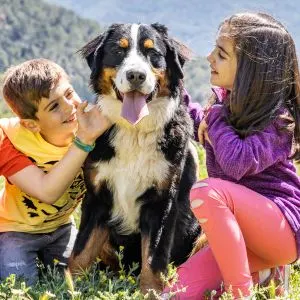Are you considering adding a four-legged family member to your home? Maybe you have your heart set on a Bernese Mountain Dog?
Well, you are not alone. Known for their majestic appearance, gentle disposition, and unwavering loyalty, Bernese Mountain Dogs (aka Bernies) make excellent companions. They are also often praised for their remarkable compatibility with children, making them an ideal choice for many families.
However, while the Bernie boasts numerous qualities that can make them a fantastic addition to your household, it’s crucial to acknowledge that they may not be the perfect fit for everyone.
Before falling completely for them, it’s important to consider various aspects of their care, health, and lifestyle needs. From their considerable size and grooming requirements to potential health issues, ensuring that you can meet these demands is essential for the happiness and well-being of both the dog and your family.
Let’s look at some of the reasons why you shouldn’t get a Bernese Mountain Dog, despite their many appealing traits.

13 Reasons Why You Shouldn’t Get a Bernese Mountain Dog
1. Size
The sheer size of a Bernese Mountain Dog is one of the most significant factors to consider. Males can stand up to 27.5 inches at the shoulder and weigh anywhere from 80 to 115 pounds or more, with females being slightly smaller.
This substantial size means they require more space than smaller breeds, both indoors and out. Their large bodies and energetic nature can inadvertently lead to knocked-over items or small children being bumped into.
For households with limited space, such as small apartments or homes without yards, accommodating the size of a Bernese Mountain Dog can be challenging.
Furthermore, traveling with a dog of this size requires considerations for adequate space in vehicles and potential restrictions with accommodations.

2. Shedding
Bernese Mountain Dogs are known for their beautiful, thick coats, but with that beauty comes a considerable amount of shedding. They shed moderately throughout the year and heavily during seasonal changes. This can be a significant issue for families who value cleanliness or have members with allergies.
3. Non-Hypoallergenic
Bernese Mountain Dogs are not hypoallergenic. Their constant shedding spreads allergens throughout the home. This can make living with a Bernese Mountain Dog a challenge for allergy sufferers and can limit their interactions with the pet.
Families with allergy concerns may need to consider other breeds that are more compatible with their health needs. You can find 17 Big Dogs That Don’t Shed in our post on the subject.

4. Grooming Needs
The luxurious, long coat of a Bernese Mountain Dog requires regular grooming to maintain its condition and prevent issues. This breed’s thick fur can quickly become matted and tangled without frequent brushing, which can lead to skin infections and discomfort for the dog.
Beyond brushing, their grooming regimen includes regular baths, nail trims, and ear cleanings to keep them healthy. For families with a busy lifestyle, the time commitment needed for proper grooming can be burdensome.
5. Drooling
While not all Bernese Mountain Dogs are heavy droolers, many do drool, especially after drinking water or during hot weather. This drooling can become a nuisance for some families.
6. Health Issues
Bernese Mountain Dogs are prone to a range of health problems that can lead to emotional stress for families and potentially high veterinary costs.
Some of the health concerns include:
- Hip and Elbow Dysplasia: These conditions involve the abnormal development of the hip and elbow joints, leading to pain, lameness, and arthritis.
- Cancer: Unfortunately, Bernese Mountain Dogs have a higher risk of certain types of cancer compared to other breeds, which can significantly shorten their lifespan.
- Heart Diseases: They can be susceptible to various heart conditions that may require ongoing medical management.
- Bloat (Gastric Dilatation-Volvulus): This life-threatening condition occurs when the stomach fills with gas and twists on itself, requiring immediate veterinary intervention.
Prospective owners should be prepared for the possibility of dealing with complex health problems and the associated care and costs.

7. Lifespan
Bernese Mountain Dogs have a relatively short lifespan, typically ranging from 7 to 10 years. This short lifespan can be hard for families.
8. Requires Extensive Socialization
Bernese Mountain Dogs were originally bred for farm work and guarding, which means they naturally want to protect and are wary of strangers. This protective nature requires them to be well socialized at an early age to avoid behavior problems.
Without this early exposure to various people, settings, and other animals, their natural guarding tendencies can manifest as problematic behaviors, including fear, aggression or excessive shyness in unfamiliar situations.

9. Heat Sensitivity
For people who live in warmer climates, the Bernese Mountain Dog may not be the best choice. Their long, thick coat makes them especially vulnerable to heat. Extra precautions are necessary during hot summer months to prevent overheating.
Providing a cool, comfortable environment can be a challenge in warmer climates. Owners must be particularly cautious to avoid heatstroke, a dangerous condition that can quickly become fatal for these heat-sensitive dogs.
10. Social Needs
Bernies are highly social creatures that thrive on interaction with their human families and other dogs. Their need for social engagement is significant, and they do not do well when left alone for extended periods.
This breed is prone to separation anxiety, which can manifest in destructive behaviors, excessive barking, or signs of depression when they’re isolated or neglected.

11. Training Challenges
Bernese Mountain Dogs, despite their gentle nature, can exhibit a degree of stubbornness that poses challenges during training.
This trait, reflective of their independent thinking developed through their history as farm dogs, means they might not always respond immediately to commands or may choose to follow their own will over instruction.
This stubborn streak requires patience and consistency from their owners to effectively manage. It’s important for potential owners to be prepared for this aspect of their personality, as overcoming this stubbornness is key to ensuring they grow into well-mannered and obedient companions.
12. Not Suitable for Apartment Living
Bernese Mountain Dogs, due to their large size may find apartment living challenging. The limited space in apartments can restrict their ability to move around comfortably, which is important for their overall health.
While they are not high-energy dogs, they still require regular exercise to stay healthy, and the confined space of an apartment might not adequately meet these needs.

13. Cost of Ownership
Owning a Bernese Mountain Dog means higher expenses due to their size. Everything from food to toys, and even general care costs more for larger dogs. Their substantial appetite requires more food, and because of their size and energy, they need durable toys that often come at a higher price.
Additionally, routine healthcare, including check-ups and preventive treatments, can also be more expensive for large breeds. This increase in cost is something potential owners should consider before bringing a Bernese Mountain Dog into their home.

Should you get a Bernese Mountain Dog?
While Bernese Mountain Dogs are undoubtedly loving, loyal companions that can bring immense joy and fulfillment to the right home, they also come with a set of challenges that may not be suitable for every family.
From their large size and grooming needs to their health issues and the financial commitment required, potential owners must carefully consider these factors.
Understanding the responsibilities and costs associated with raising a Bernese Mountain Dog is crucial to ensure a happy and healthy life for both you and the dog.
If after considering these points, you feel that a Bernese Mountain Dog is not the right fit for your household, there are many other breeds with different characteristics that may be more aligned with your lifestyle and capabilities.
However, if you’re prepared to meet these challenges, owning a Bernese Mountain Dog can be an incredibly rewarding experience, filled with love, companionship, and unforgettable moments.
